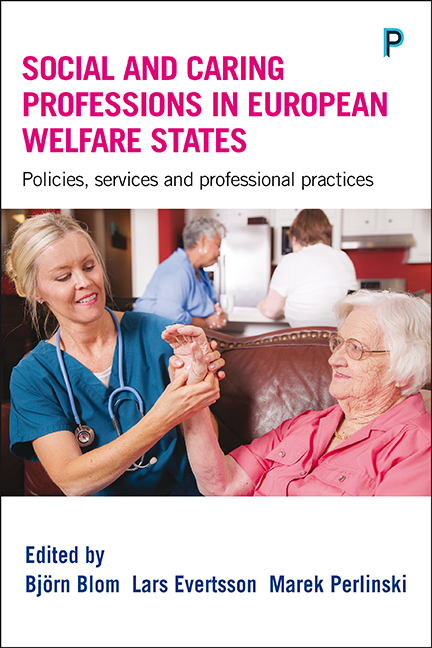 Social and Caring Professions in European Welfare States
Social and Caring Professions in European Welfare States Book contents
- Frontmatter
- Contents
- List of tables and figures
- Notes on contributors
- Preface
- one European social and caring professions in transition
- Part 1 Knowledge, reflection and identity in the social and caring welfare professions
- Part 2 Control, regulation and management
- Part 3 Collaboration, conflict and competition
- Part 4 Assessment, negotiation and decision making
- Index
thirteen - On the unnoticed aspects of professional practice
Published online by Cambridge University Press: 05 April 2022
- Frontmatter
- Contents
- List of tables and figures
- Notes on contributors
- Preface
- one European social and caring professions in transition
- Part 1 Knowledge, reflection and identity in the social and caring welfare professions
- Part 2 Control, regulation and management
- Part 3 Collaboration, conflict and competition
- Part 4 Assessment, negotiation and decision making
- Index
Summary
Introduction
In the policy for implementation of the Social Investment Package of the European Commission 2013-14, European welfare states were encouraged to invest in welfare and to reform welfare states. It was emphasised how they should ‘streamline governance and reporting’ with a focus on ‘monitoring financial, economic and social outcomes’, and ‘building evidence based knowledge and policy’ (European Commission, 2013). Denmark seems to comply with these discourses of governance. Currently, the prevailing ideas of governing and reforming welfare services are focused on so-called evidence-based research (EBR), policy and practice (EBP) (Hansen and Rieper, 2010; Hogsbro, 2010). For example, the National Board of Social Services promotes a combination of evidence-based methods, systematic knowledge production, and cost-benefit and cost-effectiveness analysis to be implemented in practice (Nissen, 2015). In Denmark, there has not yet been a comprehensive and coherent research programme exploring the consequences of this form of governance. Albeit it is assumed that EBR and EBP will improve welfare services, there is currently no evidence that it will in fact enhance quality and accountability in professional practice. On the contrary, a major critique of EBR and EBP is that the inevitable contextual conditions of welfare services and the complexities of professional practices are ignored (Pawson, 2006).
Professional practice is dependent on the capacity to perform professional discretion in complex contexts and situations dealing with ambiguous problems, which do not prescribe a certain solution. Within this realm it becomes extremely important that professionals have the capability to act with constant care. This capacity to deal with what is not evident is often considered a constitutive element of professional practice (Grimen, 2008). If this inherent ambiguity of professional practice goes unnoticed, there is a risk that efforts to streamline performance will be counterproductive, because it would not facilitate, and in worst case would undermine, professional discretion. Accordingly, the aim of this chapter is to make visible some important aspects of professional practice that go unnoticed in the realm of EBR and EBP. We show how professional practice is far from streamlined due to contextual and situational complexities – and how in particular negotiation in ‘fuzzy’ realities, reflection on risks and cooperation despite controversies are crucial in terms of handling these ambiguities. We do that progressively throughout the chapter, providing an analysis of cases, each and together illustrating this point.
- Type
- Chapter
- Information
- Social and Caring Professions in European Welfare StatesPolicies, Services and Professional Practices, pp. 193 - 208Publisher: Bristol University PressPrint publication year: 2017


